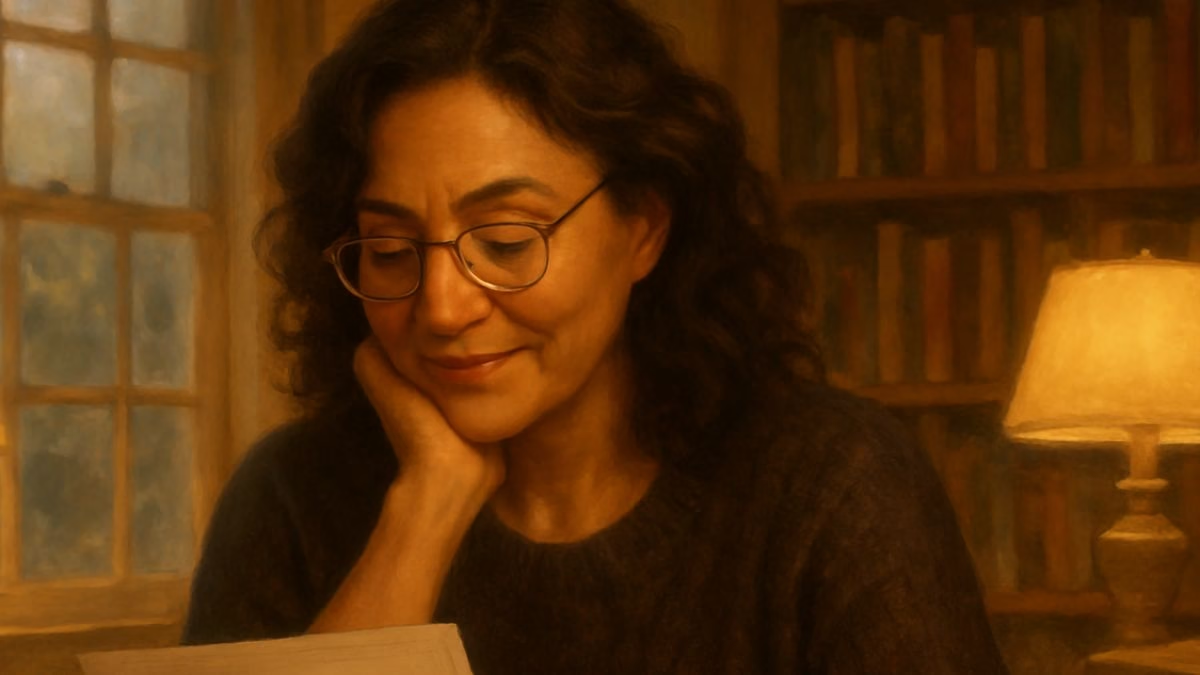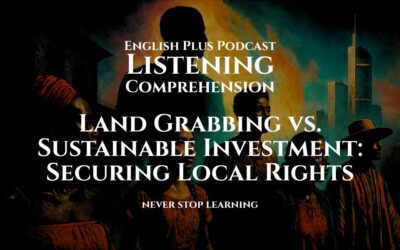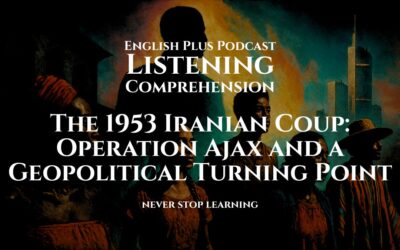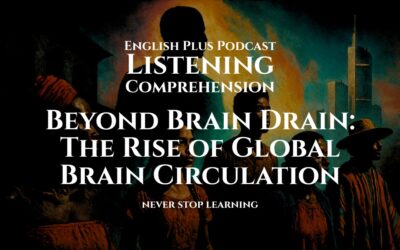Listening for Reflection and Emotion
Today’s listening practice is a personal monologue. This style tests your ability to follow a story and understand the speaker’s feelings. Here are some tips to guide you:
- Track the Timeline: The author will likely move between the past (writing the book), the present (the nomination), and the future. Listen for time-related words like “Years ago,” “When I first started,” “Now,” and “Looking ahead” to keep the story straight.
- Identify Feelings: Go beyond the words. The speaker will use descriptive language to express their emotions. Listen for adjectives that describe feelings: “surreal,” “daunting,” “grateful.” What is their emotional journey?
- Understand the “Why”: The most important part of a reflection is understanding why something is meaningful. Don’t just hear that the nomination is important; listen for why it’s important to this specific author. What does it represent to them?
Let’s listen in.
Anticipating the Topic: An Author’s Reflection
You will hear an author giving a short, personal speech after being nominated (or “shortlisted”) for a prestigious literary award. The book in question is called The Salt-Stained Map. Expect to hear about the author’s inspiration for the book, the challenges of writing it, and their complex feelings about this new recognition.
Key Vocabulary and Phrases
These words and phrases from the author’s reflection will help you grasp the deeper meaning of their story.
Shortlisted: Selected for a final stage of consideration in a competition or for a job.
How we used it: “To find my name, and the title of my novel, The Salt-Stained Map, shortlisted for the Atherton Prize is… well, ‘surreal’ is the only word that comes close.”
Surreal: Having the qualities of a dream; bizarre or strange.
How we used it: “…’surreal’ is the only word that comes close.”
Genesis: The origin or mode of formation of something.
How we used it: “And it feels like a good moment to reflect on the genesis of this book, because it wasn’t an easy one to write.”
Solitary: Done or existing alone.
How we used it: “Writing is, by its nature, a deeply solitary act.”
Daunting: Seeming difficult to deal with in anticipation; intimidating.
How we used it: “And the silence of that empty page was often daunting.”
Meticulous: Showing great attention to detail; very careful and precise.
How we used it: “It was born from a box of old letters I found in my grandmother’s attic, letters written by my great-grandfather… The research was meticulous, almost obsessive.”
Cathartic: Providing psychological relief through the open expression of strong emotions.
How we used it: “Writing his story, giving him a voice, became a deeply personal and cathartic experience.”
Resonate: To evoke or suggest images, memories, and emotions. To be relatable.
How we used it: “…to know that this very personal story has managed to resonate with readers, and now with the esteemed judges of this prize, is the most profound form of validation.”
Validation: Recognition or affirmation that a person or their feelings or opinions are valid or worthwhile.
How we used it: “…is the most profound form of validation.”
Imposter syndrome: The persistent inability to believe that one’s success is deserved or has been legitimately achieved as a result of one’s own efforts or skills.
How we used it: “There’s a good dose of imposter syndrome, of course—that little voice that asks, ‘Are you sure they meant you?'”
Whirlwind: A situation in which a lot of things happen very quickly.
How we used it: “This whole experience, since the longlist was announced, has been a whirlwind.”
Homage: Special honor or respect shown publicly.
How we used it: “This book was always an homage to them, to the quiet, forgotten histories that live in all our families.”
Listening Audio
Listening Transcript: Please do not read the transcript before you listen and answer the questions.
Good evening. When I was asked if I would say a few words tonight, I honestly didn’t know where to begin. To find my name, and the title of my novel, The Salt-Stained Map, shortlisted for the Atherton Prize is… well, ‘surreal’ is the only word that comes close. It’s a word we authors probably overuse, but some moments in life simply defy our usual vocabulary. This is one of them. I am standing here tonight alongside writers I have admired for years, writers whose books line my own shelves and have shaped my own journey. It is an honor that I am still trying to fully process.
And it feels like a good moment to reflect on the genesis of this book, because it wasn’t an easy one to write. It took me nearly seven years from the first sentence to the last. Writing is, by its nature, a deeply solitary act. For those seven years, the world of this book was a private one, inhabited only by me and my characters. It was a world built in the quiet, early hours of the morning before my children woke up, and in stolen moments late at night. There were hundreds of days when I was convinced the story was failing, that I wasn’t a good enough writer to do it justice. And the silence of that empty page was often daunting.
The Salt-Stained Map is not a work of pure imagination. It was born from a box of old letters I found in my grandmother’s attic, letters written by my great-grandfather during his time as a merchant sailor in the 1920s. His words were so full of longing, of incredible descriptions of faraway ports, and of a deep, quiet sadness. He was a man I had never met, a ghost in our family history, but his voice felt so present, so alive in those letters. I felt an immense responsibility to tell his story, or at least, a version of it. The research was meticulous, almost obsessive. I spent months in maritime archives, learning the names of ships, the slang of the sailors, the precise routes they would have taken across the Atlantic. I needed the world to feel real, so that the emotional truth of his story could have a solid place to land.
My great-grandfather was not a famous man. He wasn’t a hero in any traditional sense. He was just one of millions of ordinary people navigating an extraordinary and rapidly changing world. He struggled, he loved, he lost, and most of his story was lost to time. Writing his story, giving him a voice, became a deeply personal and cathartic experience. It was my way of connecting with my own past, of understanding the invisible threads that connect us to the generations that came before us. This book was always an homage to them, to the quiet, forgotten histories that live in all our families.
So, you can perhaps imagine what it feels like to have that very private, very personal project suddenly thrust into the public light. It’s wonderful, of course, but it’s also terrifying. You spend years with these characters, protecting them, and then you send them out into the world and hope that people will be kind to them, that people will understand. And to know that this very personal story has managed to resonate with readers, and now with the esteemed judges of this prize, is the most profound form of validation an author could ever ask for. It’s a message that says, “We heard you. That quiet story mattered.”
This whole experience, since the long list was announced, has been a whirlwind. There are interviews and photographs and congratulations from people I haven’t spoken to in years. It is all lovely and exciting. But I have to be honest, there’s a good dose of imposter syndrome, of course—that little voice that asks, ‘Are you sure they meant you?’ I think most writers have that voice. It’s the companion to the solitary work. But tonight, standing here, that voice is a little quieter.
Being nominated doesn’t mean the book is perfect. I am still its harshest critic, and I know every single flawed sentence, every clumsy paragraph I wish I could rewrite. But what this nomination does is, it puts a light on the story itself. It means more people might find their way to my great-grandfather’s world, and perhaps be prompted to think about their own family’s forgotten stories. And that is the greatest prize of all.
So, I want to thank the judges of the Atherton Prize, not just for this incredible personal honor, but for believing in a quiet book about history, family, and the sea. I want to thank my agent and my editor, who believed in this book even when I did not. And most of all, I want to thank you, the readers. You are the ones who take our solitary work and give it a life we could never have imagined. This is for you. Thank you.










0 Comments